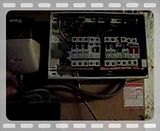So we're dealing with a curious one at the moment. So I'm interested to hear your views.
We have had reports from a customer (A) that every time one of two neighbours uses their lawn mower, customer A's RCD trips. They are all fed from the same main and are on the same phase.
The system is TN-S (non PME) and the earthing is via the cable sheath with good ELIs.
We keep getting calls to this and despite suggesting that the RCD needs fully tested the electrician seems to be back heeling it to the customer (though he did contact me directly some weeks ago about the problem, to be told to check or change the RCD).
The two houses "causing" this both have RCDs but these are not tripping.
We have confirmed that both mowers are modern and double insulated.
I have dealt with similar where the RCD supplying the sauna in a large house tripped every-time the grass was cut in the adjacent churchyard. We changed the RCD and the problem was resolved!!
My feeling is that the RCD is held closed by an electrical "latch" that is over sensitive so is tripping from the small volt drop caused by the motor start, possibly coupled with a high value of residual leakage in the property. The RCD was fitted when a new kitchen was installed but, as far as we know, the remainder of the wiring was untouched.
We have had reports from a customer (A) that every time one of two neighbours uses their lawn mower, customer A's RCD trips. They are all fed from the same main and are on the same phase.
The system is TN-S (non PME) and the earthing is via the cable sheath with good ELIs.
We keep getting calls to this and despite suggesting that the RCD needs fully tested the electrician seems to be back heeling it to the customer (though he did contact me directly some weeks ago about the problem, to be told to check or change the RCD).
The two houses "causing" this both have RCDs but these are not tripping.
We have confirmed that both mowers are modern and double insulated.
I have dealt with similar where the RCD supplying the sauna in a large house tripped every-time the grass was cut in the adjacent churchyard. We changed the RCD and the problem was resolved!!
My feeling is that the RCD is held closed by an electrical "latch" that is over sensitive so is tripping from the small volt drop caused by the motor start, possibly coupled with a high value of residual leakage in the property. The RCD was fitted when a new kitchen was installed but, as far as we know, the remainder of the wiring was untouched.


